Which URL targeting should I use for my a/b test?
https://docs.convertize.io/fr/docs/comment-cibler-des-url-specifiques-ou-des-groupes-durl/When you set up an A/B test in Convertize, it is crucial to specify the pages on which your experiment should run. URL targeting allows precise control over which URLs are included or excluded from your experiment.
To configure URL targeting for your A/B test, navigate to the Experiment tab in the Options menu.
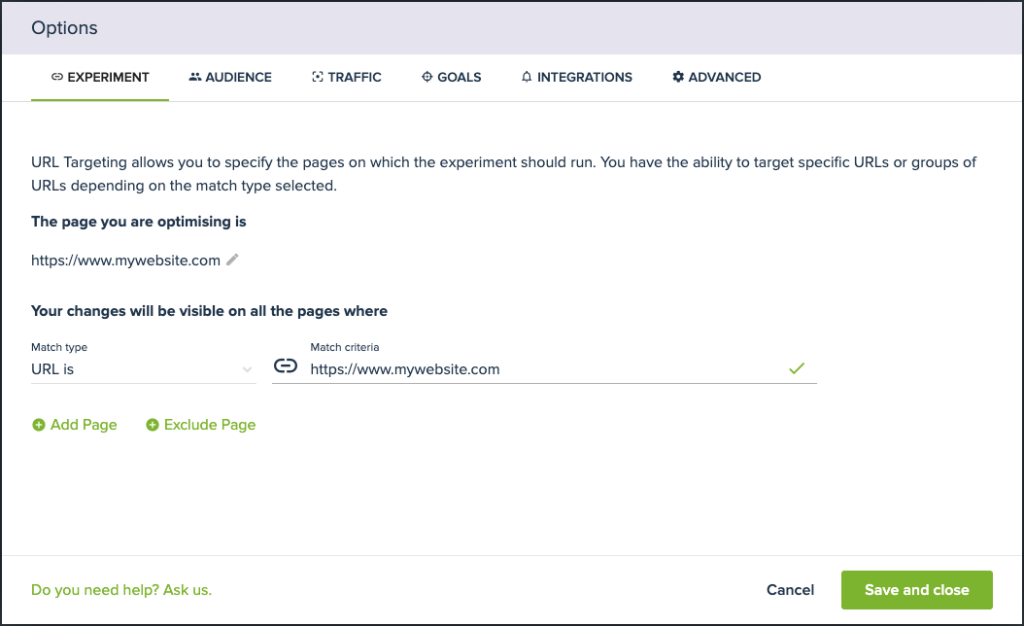
Choosing a Match Type
Convertize offers six match types to target URLs or groups of URLs for your A/B tests:
- URL contains
- URL does not contain
- URL is
- URL starts with
- URL ends with
- URL matches pattern
URL Contains
This match type checks if the page URL contains any string or substring you specify. It looks for matches anywhere within the URL, regardless of position.
Example:
If the parameter is a=1, the following URLs will match:
http://www.mywebsite.com/a=1http://www.mywebsite.com/page/a=1http://www.mywebsite.com/page/subpage/a=1
The following URLs will not match:
http://www.mywebsite.com/http://www.mywebsite.com/pagehttp://www.mywebsite.com/page/subpage
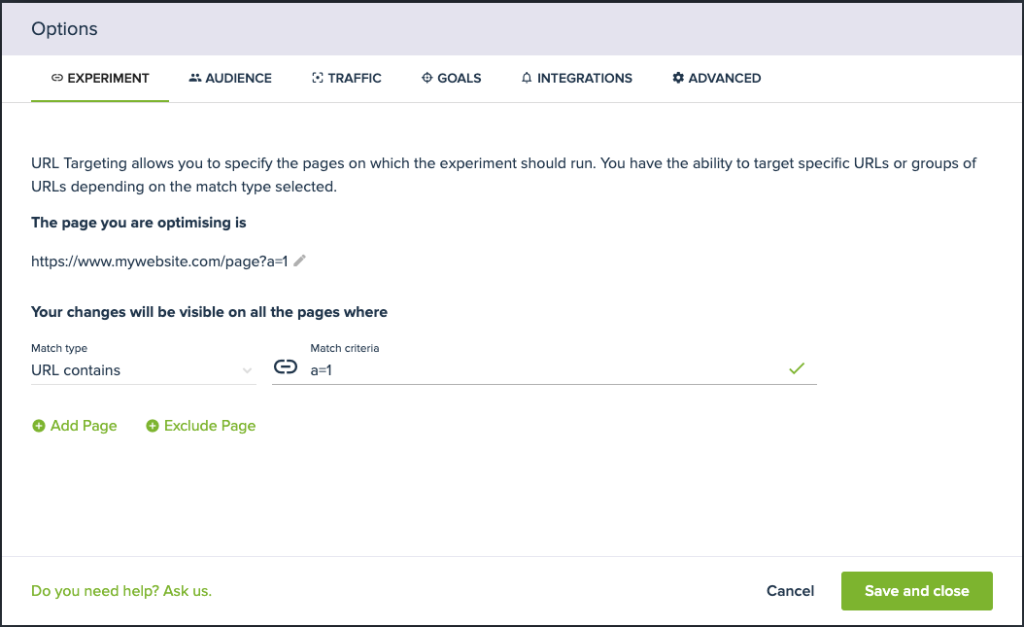
URL Does Not Contain
This match type ensures that the page URL does not include the string or substring you specify. Any URL containing the specified text will be excluded from the match.
Example:
If the value is www.mywebsite.com/page, the following URLs will match:
http://www.mywebsite.com/http://www.mywebsite.com/a=1http://www.mywebsite.com/page/category/page/
The following URLs will not match:
http://www.mywebsite.com/pagehttp://www.mywebsite.com/page/subpagehttp://www.mywebsite.com/page/a=1
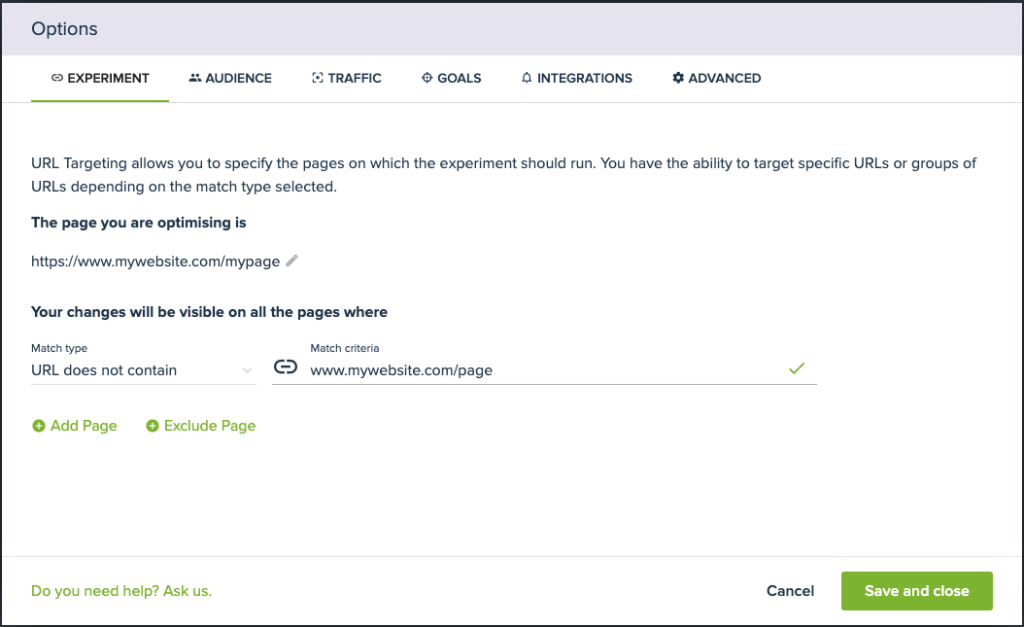
URL Is
This match type targets a single, specific URL. The URL must match exactly as entered, including the protocol (http or https). Additional query parameters or paths will not match unless explicitly included in the URL.
Example:
If the exact URL you enter is https://www.mywebsite.com/page, the following will match:
https://www.mywebsite.com/page
However, the following will not match:
https://www.mywebsite.com/page?query=123(additional query parameters not included)http://www.mywebsite.com/page(different protocol)
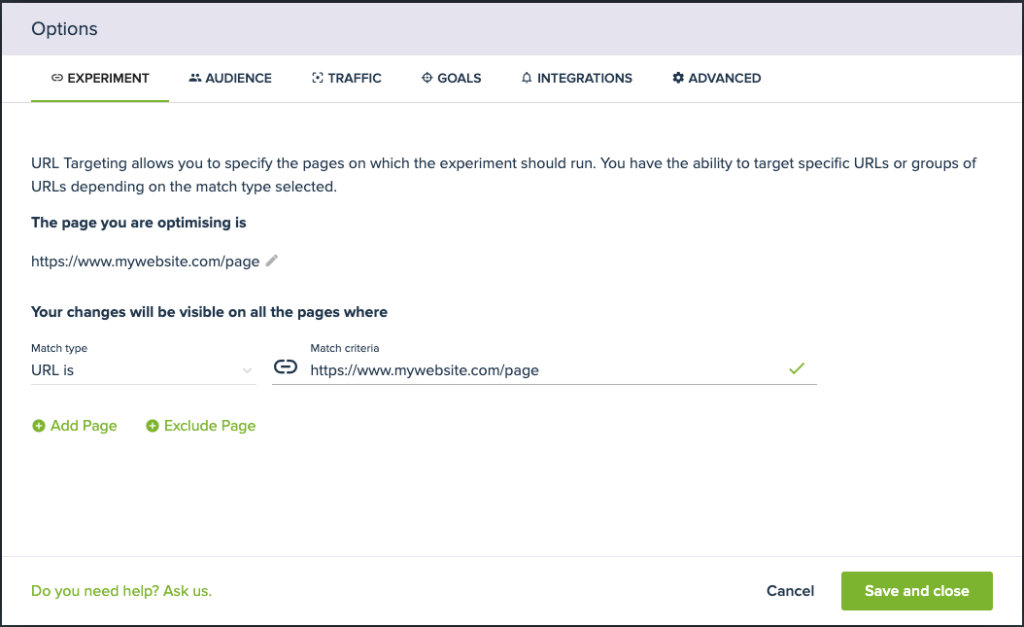
URL Starts With
The URL must begin with the specified value. This allows flexibility for targeting all pages or paths that share a common prefix.
Example:
If the target is http://www.mywebsite.com/page, the following URLs will match:
http://www.mywebsite.com/pagehttp://www.mywebsite.com/page/subpagehttp://www.mywebsite.com/page/subpages/a=1
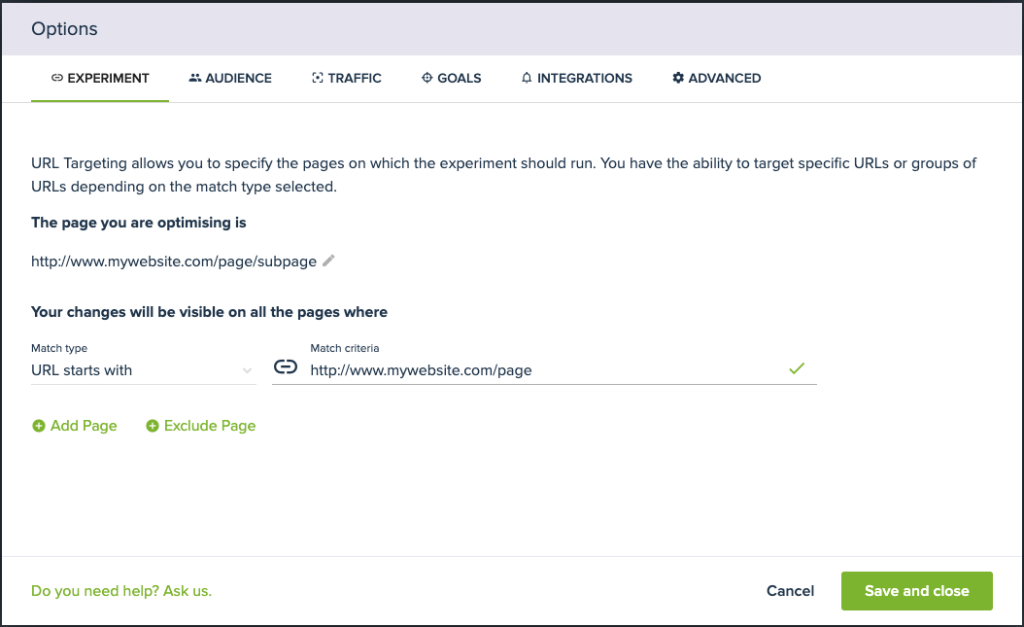
URL Ends With
The URL must end with the value you specify, regardless of the prefix or query parameters.
Example:
If the target is mypage/, the following URLs will match:
http://www.mywebsite.com/mypage/http://www.mywebsite.com/page/mypage/http://www.mywebsite.com/page/subpage/mypage/
The following URLs will not match:
http://www.mywebsite.com/mypage/a=1http://www.mywebsite.com/page/mypage/subpage/
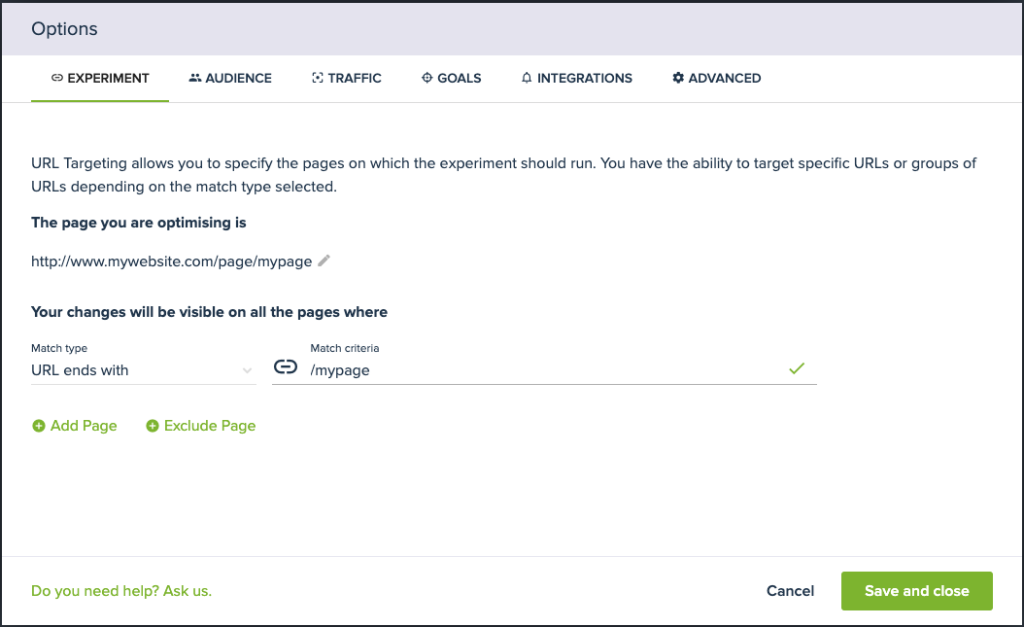
URL Matches Pattern (Wildcard)
This match type allows you to use the * wildcard to replace variable parts of the URL, making it easier to match multiple pages with a similar structure or pattern.
Example:
If the pattern is */product/*/purchase, the following URLs will match:
http://www.mywebsite.com/product/toaster/purchasehttp://www.mywebsite.com/product/35/purchase
The following URLs will not match:
http://www.mywebsite.com/product/toasterhttp://www.mywebsite.com/toaster/purchase
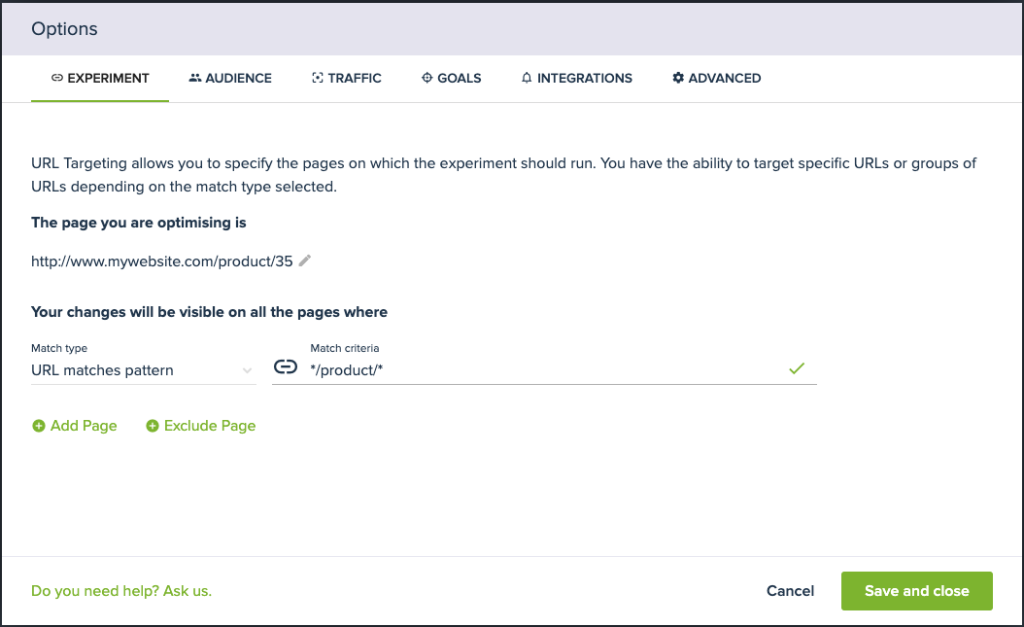
URL Matches Regex
This match type is designed for advanced targeting using regular expressions (RegEx). It allows you to specify complex patterns for URLs that are not easily defined by other match types or simple wildcards.
Example:
If the pattern is /product/.+/purchase, the following URLs will match:
http://www.mywebsite.com/product/toaster/purchasehttp://www.mywebsite.com/product/35/purchase
The following URLs will not match:
http://www.mywebsite.com/product/toasterhttp://www.mywebsite.com/toaster/purchase
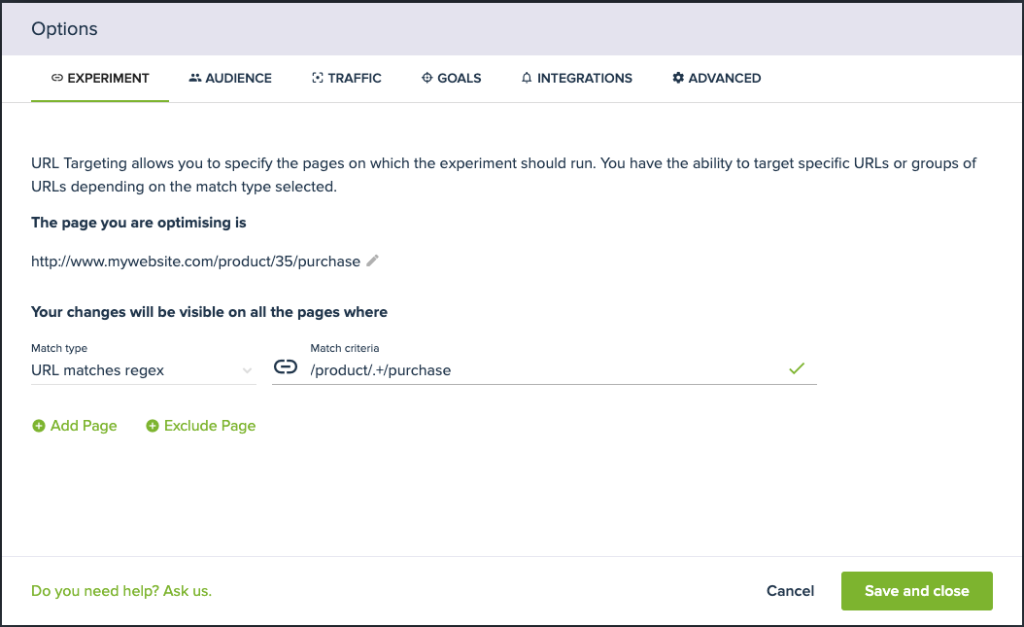
Including and Excluding Multiple Pages
You can include multiple URLs in your experiment. An OR condition is applied, meaning the experiment will run on any page that matches one of the specified URLs.
To exclude specific pages, add them to the exclusion list. Excluded pages take precedence, ensuring they are not included in the experiment even if they match an inclusion rule.
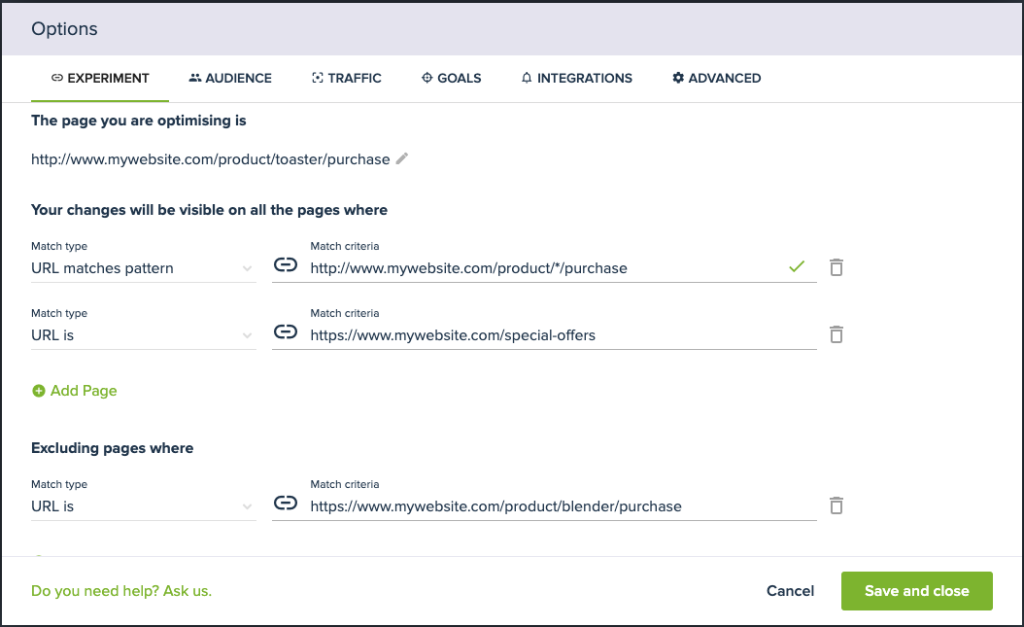
Avoid Targeting Conflicts
In Convertize, only one experiment can be applied per page at a time. If multiple experiments target the same page(s) simultaneously, visitors are randomly assigned to one experiment, which remains consistent for them on subsequent visits. While this ensures a consistent experience for each visitor, splitting traffic between experiments causes smaller sample sizes for each test. This results in longer testing periods to reach statistical significance and reduces the reliability of results, as smaller sample sizes are more susceptible to variability and less likely to detect meaningful differences between variations.
Example of a Targeting Conflict
If you run two experiments with the following targeting:
- Experiment 1: URL contains
www.example.com - Experiment 2: URL is
www.example.com/pricing
Visitors to www.example.com/pricing will be randomly assigned to either experiment. As a result, traffic is divided, and Experiment 2 (specific to the pricing page) will receive fewer visitors, prolonging its testing duration and making its results less robust.
How to Solve a Targeting Conflict
- Refine Targeting Rules: Use specific rules (e.g.,
URL contains www.example.com/product*) to avoid overlap. - Sequence Experiments: Run one experiment at a time when targeting the same page.
- Combine Experiments: If feasible, merge tests into a single experiment with multiple variations to maximize traffic and insights.
By eliminating conflicts, you can ensure faster, more reliable results from your A/B tests.
Need assistance with your URL targeting? Contact our support team via the in-app chat by clicking the blue bubble on the bottom right of your screen. We’re here to help!